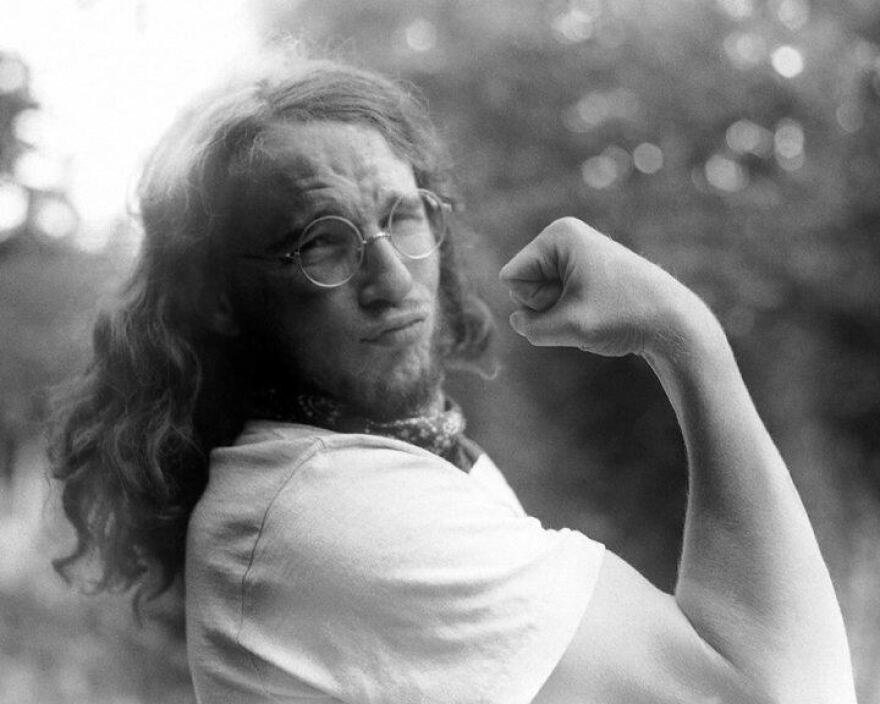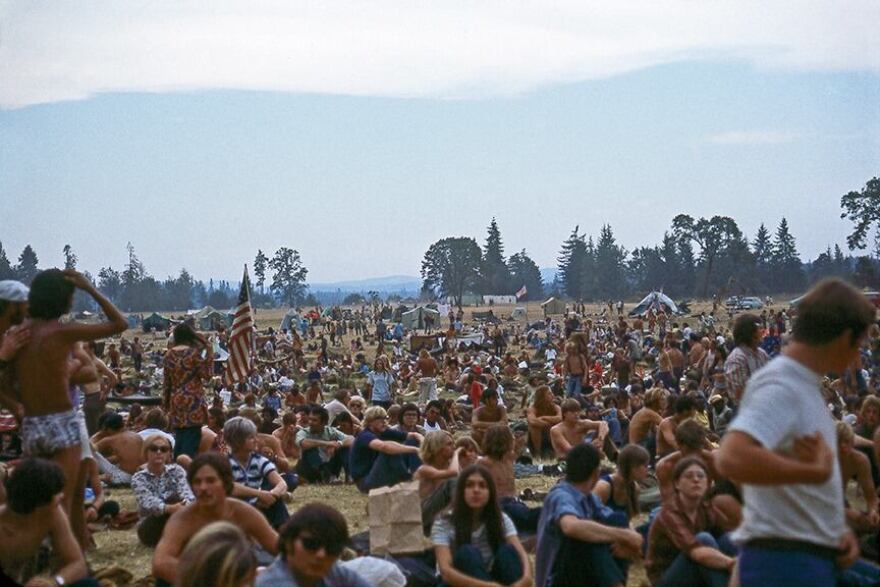Drugs, sex, rock ‘n’ roll and Republican politics converged in an Oregon forest in the summer of 1970 to pull off an unlikely scheme. It was a tense time in America. Protests across the nation were ending in bloodshed, including in downtown Portland.
In an unlikely partnership, Oregon’s Republican governor teamed up with a group of self-described hippies to throw a drug-fueled rock festival in the woods. Oregon Vortex 1: A Biodegradable Festival of Life served as a distraction from a potentially volatile situation in Portland. Fifty years later, another group attempted to honor the spirit of Vortex before it was cut short by a pandemic nobody saw coming. Now, in a climate with uncanny similarities to the one in 1970, the story of Vortex 1 lives on as an example of community in a time of division.
America was on edge. On May 4, 1970, Ohio National Guard troops opened fire on a group of students on the campus of Kent State University who were protesting the escalation of the Vietnam War. The troops killed four unarmed protesters and wounded nine others, sparking outrage across the nation.
At Portland State University, students initiated a series of peaceful sit-ins across the downtown campus. After a car barreled into a protester on May 6, breaking his leg, the demonstrators began erecting barricades around the South Park Blocks.
Inundated by complaints about the blocked off streets and the actions of some student demonstrators, Portland Mayor Terry Schrunk ordered the Portland Police Bureau on May 11 to move in and break up the barricades. That afternoon, a group of PPB officers decked out in white helmets, leather jackets and brandishing long clubs lined up outside the park blocks. They descended on the protesters, marching in formation.
The officers used brutal force to disperse the students, sending 31 to local hospitals for treatment in what was later known as the “battle for the South Park Blocks.” Outraged over the show of force, more than 4,000 people marched on City Hall the next day.
As Portland continued to heal from the actions of May 11, news broke that the American Legion, a group of veterans largely supportive of the U.S. role in Vietnam, was coming to town at the end of August for their annual convention. Republican President Richard Nixon, who was the subject of many anti-war protesters’ hatred, was slated as the guest of honor.
The FBI called then-Gov. Tom McCall with a warning. According to the bureau, as many as 50,000 anti-war protesters were planning to come to the city to push back on the American Legion’s message. The law enforcement agency warned of potentially violent clashes on a scale Portland hadn’t seen.
“The FBI advised us this was going to be the most volatile confrontation in the country,” Ed Westerdahl, McCall’s executive assistant at the time, told OPB of the call. “We took that serious.”
In this chaos, an unlikely idea was hatched.
A few weeks after the announcement that Nixon and the American Legion were coming to town, a coalition of Portland-based anti-war groups known as the Peoples’ Army Jamboree held a meeting to help organize their response.
“It was very chaotic,” Lee Meier, an activist and local social worker at the time, remembered of the meeting of nearly 300 people. Some people in the crowd were advocating for violent reactions, Meier said. He sensed trouble brewing as the plans for how to respond started to take shape. “It looked like it was heading towards a disaster, a big confrontation.”
It was at that meeting that Meier and a local minister friend started thinking of a different form of opposition — something that promoted a positive statement rather than a negative reaction.
“We figured if we were able to put together a festival or fair that stressed the counter-cultural lifestyle changes that we envisioned — peace, empathy, brotherhood, camaraderie, etc. — that that would be a good draw that would take people out of town,” he said. As far as Meier was concerned, there was only one person who could help them pull this off: the governor.
When they reached out to McCall’s office, they were shocked by the response. They went in thinking it was a Hail Mary to ask for help, but within a few weeks of that meeting, the governor’s office called Meier up with an offer: the use of Milo McIver State Park, 25 miles from Portland, for a weekend-long music festival.
“Containment. That’s why we picked Milo McIver park. Our intention was to draw people out of the city, put them in a location where they could be contained,” Westerdahl said.
Over the course of a few weeks, an unlikely crew made up of members of McCall’s Republican administration and a loosely-affiliated group of liberal Vietnam War objectors and ecological activists — some of whom later formed The Rainbow Family movement — united to plan and pull off the festival.
Elected officials announced Vortex 1 on Portland-area TV, generating buzz for it. Volunteers worked with state-provided resources to construct a stage at the park. Local businesses donated food and supplies to feed and care for the crowd. Doctors and medical professionals came to the park on the banks of the Clackamas River to volunteer their expertise and set up a medical tent. There were even reports of Oregon State Police escorting people arriving in the area to the festival grounds.
On a recent cool August morning, Meier stood at a spot in Milo McIver State Park where, nearly 50 years earlier to the day, as many as 100,000 people had partied during the Vortex 1 festival.
“This thing turned into a hippie zoo,” he remembered. “This whole area was turned into spontaneous campgrounds. Little fire pits here and there everywhere. And we had a sauna, we had a mud sauna, we had a regular sauna. So there was the requisite nudity.”
Cannabis smoke filled the air. Festivalgoers ran around the park naked. Meier remembered the wine being spiked with LSD. The laissez-faire attitude of law enforcement was intentional, according to Westerdahl. “I can be held responsible for the that because I felt it was the lesser of two evils,” he told OPB in 2010.
And though Vortex was also branded as a music festival, not many people who attended remember the music, Meier said. There were rumors that acts like Jefferson Airplane and the Grateful Dead would appear, but they never actually showed up.
”It never happened. And most of us here in the park that weren’t up at the music, you know, 100%, we had no clue. I mean, we thought Jefferson Airplane was here.” It was mostly local bands who took the stage at Vortex 1. But still, for one hot August weekend, an Oregon park in the woods transformed into the center of 1970s counter culture.
About 25 miles away, the American Legion convention went off with little incident. President Nixon canceled his visit at the last minute, with Vice President Spiro Agnew taking his place. Counterprotests were far smaller than anticipated.
“As it turned out, the predictions from the FBI were way off,” Doris Penwell, McCall’s press secretary at the time, told OPB in 2010.
“Federal intelligence indicated early this summer that upwards of 50,000 young people would be coming [to Portland],” McCall later said. “Vortex was a conscious and direct response to the problem of suddenly trying to absorb those thousands of young people into the city of Portland, young people without a place to stay.”
When all the festivalgoers were gone and the American Legion left Portland, it was clear that Vortex was a success, according to Meier. Few protesters showed up to Portland in the end. The large crowds instead appeared at Vortex, a peaceful festival that spread a message of unity in a divisive time in American history. McCall deserves a lot of the credit for that, according to Meier.
“Without Tom McCall it would not have happened,” Meier said.
Voters seemed to agree. McCall rode the success of Vortex to a landslide victory in November of 1970. He enacted many of his landmark policies — from the Oregon Bottle Bill to the state’s land-use planning laws — over his next four years in office.
Though it only lasted a few short days, the impact of Vortex on Oregon is felt to this day.
“I think the primary thing that I remember is the unifying effect, the unity of us,” Meier said. “We were all coming together to solve a problem and we didn’t have an authoritarian top-down structure. It was pretty much a community communal response.”
That spirit of community is what inspired a group of Oregonians to honor the 50th anniversary of Vortex 1.
“What we wanted to do from the very beginning was really channel the spirit of the original Vortex,” said Robyn Tanenbaum, one of the organizers behind the Vortex 2020 effort. “[Vortex 1] was planned in three or four months and people just got together, dug in and got it done.”
For the better part of a year, a group of people from across Oregon worked on a plan to honor the original festival with a new type of event.
“Vortex 2020 was to be a celebration,” Tanenbaum said, meant to honor the past event, not recreate it. Like the original, Vortex 2020 was to be a free music festival at Milo McIver State Park, featuring musical acts with local ties. Admission to the festival was tied to completing a service act through volunteering with a partner nonprofit. The goal was to inspire a new generation to volunteer in their communities. “We wanted a culture shift,” Tanenbaum said.
“Things were moving along great,” said Tammy Baumann, the Valleys Region program coordinator with Oregon State Parks. “There were artists lined up. There was money being raised.”
Then the coronavirus pandemic reached Oregon. Like many things in our modern world, the plans for Vortex 2020 were upended. The music festival was planned for Aug. 22-23, 2020. Instead, it’s unclear what the future holds for the effort.
“We just needed to stay in a humble space because the world needed to care about a lot of things and a festival that celebrated a historic time was not something the world needed to focus on,” Baumann said. Tanenbaum agreed with that sentiment but noted this isn’t the end of the road for the Vortex spirit.
“Perhaps there’s something we can glean from this and see in a post-COVID world if there’s something Vortex can do as an idea and as an organization,” Tanenbaum said.
“As far as what’s to become of Vortex: It’s a little too soon to know.”
Editor’s note: Former OPB producer Eric Cain contributed reporting to this story.
Click play on the audio player above to hear a conversation with Vortex 1 organizer Lee Meier.




Copyright 2020 Oregon Public Broadcasting

